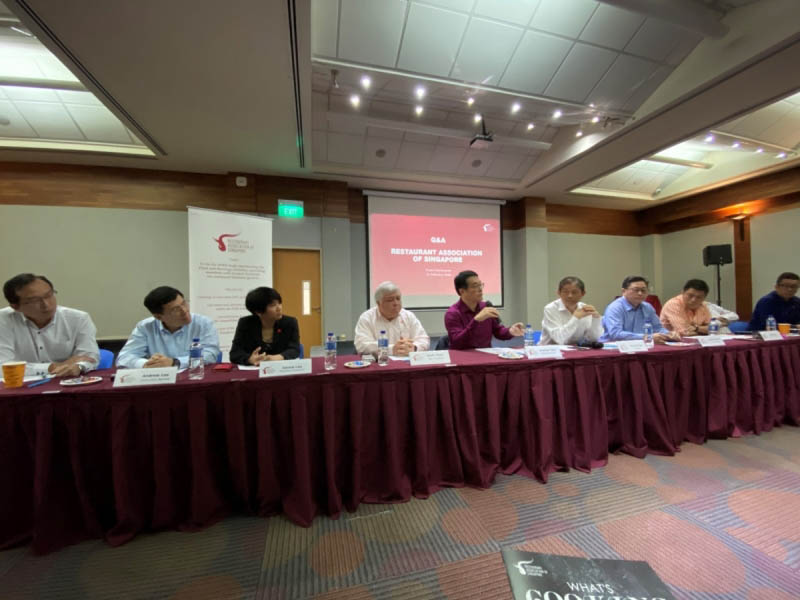Restaurant Association of Singapore Addresses Novel Coronavirus Impact on F&B Industry

It has been a tumultuous past few weeks – since the first case of the Novel Coronavirus on 23rd January 2020, to the recent announcement of the DORSCON code orange in Singapore just a week ago, the country has seen Singaporeans scrambling to buy essentials such as instant noodles and canned food, and avoiding crowded places.
This has also caused effects on the F&B industry. With Singaporeans avoiding crowded places, malls have experienced a significant drop in visitors – translating to a loss for retail outlets and restaurants.
“Restaurants have seen a significant dip in visitors, while hotels are also experiencing a drop in their occupancy rates,” said Mr. Vincent Tan, the president of Restaurant Association of Singapore. “As the collective voice of F&B in good and bad times, we believe that we need to address the concerns of restaurants.” Mr. Tan continues.
Much is still unknown about the virus, causing more panic in the community. “The most immediate and serious impact of this entire situation is fear,” Mr. Tan comments. “Our utmost priority is to preserve jobs in the industry, so we have taken measures like writing to landlords for help.”
Mr. Tan later mentions the biggest expenses incurred by restaurants – high rental fees and manpower costs, which “accounts for 50% of the business”. He also later credits Jewel Changi Airport, saying “We would like to express our utmost gratitude to Jewel Changi Airport who made the impactful decision in extending rental rebates to our fellow restauranteurs. Their kind gesture will not be forgotten and it has moved us because it comes from a sense of partnership.”
However, not all is gold. RAS has also struggled in discussing future plans to sustain restaurants with other landlords. Executive Director of RAS, Mr. Edwin Fong later shows figures collected from polls which members have participated in.
“57% of respondents are expecting more than 50% loss of revenue over the next 3 months.” says Mr. Fong. However, when asked what measures restauranteurs felt could help them in this situation, a vast majority believed government wage support and rental subsidies could minimalize the losses incurred by food businesses in Singapore.
Because of the dip, restaurant owners have decided on short-term solutions like temporarily not having part-timers in their establishments, as well as asking staff to go on unpaid leave to manage losses and preventing permanent closure.
Mr. Andrew Tjoe, the President Advisor of RAS also mentions “The losses that restaurants will face during this difficult period will be detrimental to many small restaurant owners. Even after recovery, it will be impossible to make up the losses and it will take a long time for many restaurants to will take a long time to sustain themselves. Thus, closure of restaurants are possible and are likely to happen during this time.”
With the introduction of food delivery apps recently, members of the public are opting for their food to be sent to their homes. There is still a gap in terms of revenue that food delivery is unable to cover for. “Even though there is a demand in food delivery, the decline in sales is still too huge. And food delivery platforms are still not significant enough to cover the losses.” said Mr. Tan.
The future of the industry still remains unknown; however, government agencies are predicting more cases and panic to surface in the upcoming three months. Mr. Tan concludes the session, “We hope that landlords are able to respond to restaurants need for help in this dire moment. There is more that landlords need to understand from their tenants, and we hope that with their help, we are able to sustain restaurants in Singapore, and create a strong communal support in this country.”
For more information, please visit www.ras.org.sg
 It has been a tumultuous past few weeks – since the first case of the Novel Coronavirus on 23rd January 2020, to the recent announcement of the DORSCON code orange in Singapore just a week ago, the country has seen Singaporeans scrambling to buy essentials such as instant noodles and canned food, and avoiding crowded places.
It has been a tumultuous past few weeks – since the first case of the Novel Coronavirus on 23rd January 2020, to the recent announcement of the DORSCON code orange in Singapore just a week ago, the country has seen Singaporeans scrambling to buy essentials such as instant noodles and canned food, and avoiding crowded places.